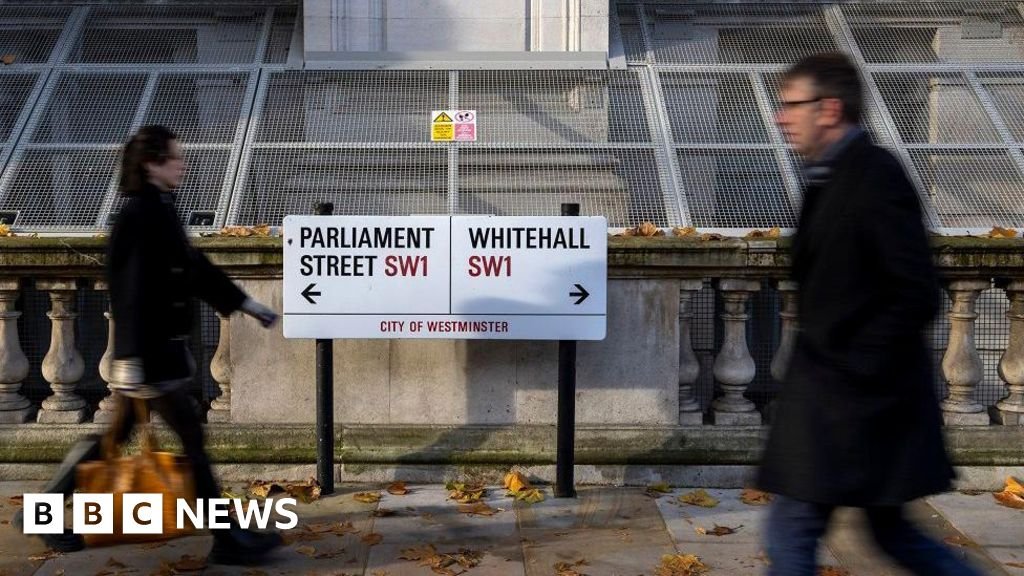Business
Civil service interns must all be working class, government says

The government will restrict civil service internships to students from poorer families as part of a drive from ministers to make Whitehall more working class.
The main internship scheme designed to attract university students to the civil service will now only be available for students from “lower socio-economic backgrounds”, judged by what jobs their parents did when they were 14.
Those who are successful on the internship will then be prioritised for entry to the Fast Stream, the main graduate programme for entry to the civil service.
The change has been driven by Pat McFadden, who as Chancellor of the Duchy of Lancaster is responsible for civil service reform.
He told the BBC: “We need to get more working class young people into the Civil Service so it harnesses the broadest range of talent and truly reflects the country.
“Government makes better decisions when it represents and understands the people we serve.”
Currently around a quarter of higher education students are from a lower socio-economic background, but the group represented only 12% of successful applicants to the Fast Stream in 2024.
Some Labour ministers have come to believe in their first year in office that parts of the civil service are too privileged, with people who have come from similar backgrounds.
A summer internship programme already exists. The programme is for undergraduates in their final two years of university, lasts six to eight weeks and is paid.
Under the changes, which will take effect for the summer of 2026, the intake will be restricted only to students from poorer backgrounds.
The programme will give them experience including planning events, writing briefings for ministers, shadowing senior civil servants and carrying out research for policy development.
Those deemed to have performed well will then be fast-tracked to the final stages of the Fast Stream selection process if they decide to apply to work in the civil service after graduation.
The government is also trying to establish more career paths into the senior ranks of the civil service outside of London, announcing earlier this year that by 2030 half of the placements on the Fast Stream will be located outside of the capital.
The Labour government has been strikingly critical of some of the practices of the civil service since coming to office in July last year. In December, Sir Keir Starmer said that “too many people in Whitehall are comfortable in the tepid bath of managed decline,” incurring criticism from civil service unions.
The prime minister has also said he wants to “rewire” the way the state works.
Conservative shadow cabinet office minister Mike Wood said the UK’s public services “deserve talent chosen on ability”.
In a statement Wood said: “We believe in opportunity based on what you can do, not where you come from.
“We all want to see greater opportunity for working-class young people. But this scheme sends the message that unless you fit a particular social profile, you’re no longer welcome.
“No young person should be told they’re not welcome based solely on leftist social engineering.”
Business
UK agrees £10bn deal to supply Norway with warships

The UK and Norway have agreed a £10bn deal under which Britain will supply the Norwegian navy with at least five new warships.
The agreement involving Type 26 frigates will be the UK’s “biggest ever warship export deal by value”, the Ministry of Defence (MoD) said, while Norway said it would be its largest “defence capability investment” to date.
The government said the deal would support 4,000 UK jobs “well into the 2030s”, including more than 2,000 at BAE Systems’ Glasgow shipyards where the frigates will be built.
UK Prime Minister Sir Keir Starmer said the agreement would “drive growth and protect national security for working people”.
“This success is testament to the thousands of people across the country who are not just delivering this next generation capabilities for our Armed Forces but also national security for the UK, our Norwegian partners and Nato for years to come,” he added.
The deal is also expected to support more than 400 British businesses, including 103 in Scotland, the MoD said.
The agreement represents a victory for the British government and defence industry over France, Germany and the United States – which were also being considered by Norway as possible vendors.
It will create a combined UK-Norwegian fleet of 13 anti-submarine frigates – eight British and five Norwegian vessels – to operate jointly in northern Europe, significantly strengthening Nato’s northern flank.
The warships will be constructed at the BAE systems yard in the Govan area of Glasgow, where frigates for the Royal Navy are currently being built.
Scottish Secretary Ian Murray said the choice of the UK “demonstrates the tremendous success of our shipbuilding industry and showcases the world-class skills and expertise of our workforce on the Clyde”.
Norway’s Prime Minister Jonas Gahr Støre, who informed Sir Keir of the decision to select the UK in a phone call on Saturday night, said the partnership “represents a historic strengthening of the defence cooperation between our two countries”.
Støre said the government had weighed two questions in its decision: “Who is our most strategic partner? And who has delivered the best frigates?… The answer to both is the United Kingdom.”
The Type 26 frigates purchased by the Royal Norwegian Navy will be as similar as possible to those used by their British counterparts, and have the same technical specifications.
They are specifically designed to detect and track enemy submarines and engage them in combat if necessary, with deliveries are expected to begin in 2030.
UK Defence Secretary John Healey said: “For over 75 years, Britain and Norway have stood together on Nato’s northern and north-eastern frontiers, keeping the UK and Europe safe. This historic defence deal deepens our strategic partnership.
“With Norway, we will train, operate, deter, and – if necessary – fight together.
“Our navies will work as one, leading the way in Nato, with this deal putting more world-class warships in the North Atlantic to hunt Russian submarines, protect our critical infrastructure, and keep both our nations secure.”
Business
First the great migration, now the big hold: why workers are staying put | US small business

The tide has turned. The great migration – when the shift to remote work prompted people to quit their jobs in droves – is officially over. Now comes the big hold.
According to a new survey from consulting firm Robert Half, 73% of respondents – workers at companies – said they plan to stay in their current roles through 2025. They gave reasons like having “positive company culture” and “feeling professionally fulfilled” or “being well compensated” at their current job. But there’s also a fourth reason why so many are staying put: the job market isn’t great and people are worried.
Job growth is significantly down. Job openings fell again to under 7.5m last month, a level that’s 4m below the openings available back in 2022. Wage gains during that same period had fallen from 6.7% to 4.1%.
Microsoft, AT&T, JP Morgan, Amazon and other companies are mandating their employees to return to their offices or lose their jobs. AI is already replacing workers at tech companies, Wall Street firms and retailers and some fear greater job losses in the not too distant future. Other cost cutting measures are leading big brands like Citi, Accenture, Tesla and Intel and other corporate giants to lay off tens of thousands of workers.
And what a great opportunity for small businesses!
For example, there’s my friend in Illinois. He has over 100 employees in his office. For years, he’s been spending half his days just walking around and talking to them. Telling them how important they are. Checking in on their lives and families. Asking them what they’re doing and what problems they’re having. Imagine working for that guy. Someone who genuinely cares about his workers. His turnover’s low. His retention is high.
Or another client of mine in Pennsylvania who allocates a big piece of his operating budget every year to employee technical training. Fear AI? “No way”, he tells me. “I want my people to embrace it! They need to learn about all the AI features in our software applications so that they can not only get more work done for me during the day but have a more balanced life themselves.” Did I mention that he gets workforce development money from his state that pays for this extra training? Now you know.
Another client of mine gives employees a $1,000 educational “credit” to use however they want. “They can learn origami or take a knitting class for all I care,” she said to me. “Becoming a better person makes you a better worker too.” Not coincidentally, she also enjoys the tax deductions allowed for providing this benefit.
There are other tax benefits that small business owners can use to recruit and retain all this available talent for healthcare, childcare, for hiring workers who were formerly incarcerated, off welfare or out of the military.
In the midst of all this job chaos, small business hiring and employment has remained constant. The latest Small Business Employment Watch report from Paychex, the giant HR and payroll processing firm, found that in July hiring among those companies with less than 50 employees “remained steady” which, according to the company’s CEO “speaks to the resiliency of small businesses given the amount of uncertainty they faced so far this year”.
Ever since I can remember my small business clients have complained about competing with big companies and the government for talent. Well, now the tide has turned. Big companies are laying off people by the tens of thousands. Governments are cutting their headcounts. The labor market is softening. But small businesses – who already employ half of this country’s workers – are still hiring and always looking for talent. The softening job market is a great opportunity for them. And for many workers.
Business
Wytham Abbey’s asking price slashed by 60% after failure to find buyer | Property

Wytham Abbey, a 15th-century grade I-listed manor that was once planned as a hub for technologists and philosophers to solve some of the world’s toughest problems, has had its sale price slashed by 60% to £5.95m as its charity owners struggle to find a buyer.
The Effective Ventures Foundation (EVF), formerly the Centre for Effective Altruism, bought the 27-bedroom, 18-bathroom Oxfordshire estate in April 2022.
Backed by the Facebook co-founder Dustin Moskovitz’s Open Philanthropy fund, EVF envisioned the property as a hub for global thinkers combining effective altruism and artificial intelligence to “benefit others as much as possible”.
But it was forced to put the manor and extensive grounds up for sale for £15m last year after its backers withdrew support for the events venue.
The property portal Rightmove said it was one of its five most-viewed homes of 2024 but with no sale agreed the asking price was reduced to £12m in June. It was cut again in August with the UK’s luxury property market struggling amid cooling interest from the world’s super rich and Labour’s tax changes.
EVF said: “As part of its ongoing effort to maximise sale proceeds directed to high-impact charities, Effective Ventures has taken advice from leading surveyors and decided to lower the property’s guide price to encourage offers from actively interested prospective buyers.”
Savills, the agency marketing the property, declined to comment.
Over its six centuries, the abbey has welcomed an eclectic list of guests, from Queen Elizabeth I, Oliver Cromwell and Queen Victoria to Skype’s billionaire investor, Jaan Tallinn, and the jailed FTX founder, Sam Bankman-Fried. FTX was an EVF backer before its collapse.
Set in 9 hectare (23 acres) of grounds and parkland and built around 1480 from locally quarried limestone, it retains Tudor arched doorways. The Earl of Abingdon lavished money on improvements in the 18th century, adding to its grandeur. It has eight reception rooms, a Georgian-oak staircase, stained glass panels and a marble fireplace.
after newsletter promotion
At the time of its decision to sell the property, an EV spokesperson said: “Effective Ventures agreed with the abbey’s major donors at the time of the original purchase that they could recommend that EV sells the property if they believed there were higher-impact uses of the asset.”
EVF’s parent group, Effective Ventures, repaid nearly $27m (£20m) last year to the FTX estate – equal to all the funds it received from entities linked to Bankman-Fried. He was sentenced to 25 years in prison in March 2024 for defrauding customers and investors of his crypto empire, which collapsed into bankruptcy from a valuation of $32bn.
-
Tools & Platforms3 weeks ago
Building Trust in Military AI Starts with Opening the Black Box – War on the Rocks
-

 Ethics & Policy1 month ago
Ethics & Policy1 month agoSDAIA Supports Saudi Arabia’s Leadership in Shaping Global AI Ethics, Policy, and Research – وكالة الأنباء السعودية
-

 Business2 days ago
Business2 days agoThe Guardian view on Trump and the Fed: independence is no substitute for accountability | Editorial
-

 Events & Conferences3 months ago
Events & Conferences3 months agoJourney to 1000 models: Scaling Instagram’s recommendation system
-

 Jobs & Careers2 months ago
Jobs & Careers2 months agoMumbai-based Perplexity Alternative Has 60k+ Users Without Funding
-

 Funding & Business2 months ago
Funding & Business2 months agoKayak and Expedia race to build AI travel agents that turn social posts into itineraries
-

 Education2 months ago
Education2 months agoVEX Robotics launches AI-powered classroom robotics system
-

 Podcasts & Talks2 months ago
Podcasts & Talks2 months agoHappy 4th of July! 🎆 Made with Veo 3 in Gemini
-

 Podcasts & Talks2 months ago
Podcasts & Talks2 months agoOpenAI 🤝 @teamganassi
-

 Jobs & Careers2 months ago
Jobs & Careers2 months agoAstrophel Aerospace Raises ₹6.84 Crore to Build Reusable Launch Vehicle

